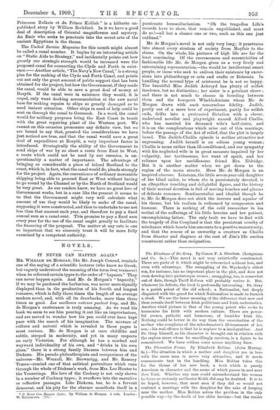NOVELS.
IT NEVER CAN HAPPEN AGAIN.*
MR. WILLIAM DE MORGAN, like Mr. Joseph Conrad, reminds one of the saying of a scientific lecturer (who knew no Greek, but vaguely understood the meaning of the term _Irat _C Af
tEv0V)
when he referred certain types to the order of " hapaces." They can never happen again. And Mr. de Morgan's " hapacity," if we may be pardoned the barbarism, was never more signally displayed than in the production of his fourth and longest romance, which is fully three times the length of an average modern novel, and, with all its drawbacks, more than three times as good. Les meilleurs auteurs parlent trop, and Mr. de Morgan's exuberance is truly amazing. As we read his book we seem to see him pouring it out like an improvisatore, and are moved to wonder how his pen could ever have kept pace with the march of his imagination. The mixture of culture and naivete which is revealed in these pages is most curious. Mr. de Morgan is at once childlike and subtle, steeped in modernity, and yet in many respects an early Victorian. For although he has a marked and wayward individuality of his own, and "drinks in his own glass," there is a strong family likeness between him and Dickens. His pseudo-philanthropists and reorganisers of the universe—Mr. Wraxall, Mr. Brownrigg, and Mr. Ramsey Tomes—remind one of that satirical portraiture which runs through the whole of Dickens's work, from Mrs. Leo Hunter to the Veneerings. His love of the Cockney is not only shown in a number of Cockney types ; it overflows into the narrative or reflective passages. Like Dickens, too, he is a fervent democrat, and his pity for the obscure manifests itself in a • It Never Can Happen Again. By William de Morgan. 2 vole. London : W. Heinemann.
passionate humanitarianism. "Oh the tragedies Life's records have to show, that remain unpublished, and must do so !--all but a chance one or two, such as this one just outlined."
Mr. de Morgan's novel is not only very long ; it penetrates into almost every stratum of society from Mayfair to the slums. On the whole, his pictures of high life are far the least convincing. Of the excrescences and eccentricities of fashionable life Mr. do Morgan gives us a very lively and entertaining representation,—the would-be intellectual smart people, or those who seek to enliven their existence by excur- sions into philanthropy or arts and crafts or Bohemia. In handling the normal type of aristocrat he is not so happy. The beautiful Miss Judith Arkroyd has plenty of selfish insolence, but no distinction ; her sister is a petulant shrew ; and there is not much to choose in breeding between them and the bourgeois Wimbledoniana whom Mr. de Morgan draws with such remorseless fidelity. Judith, partly out of a _mere love of experiment, partly for selfish ends, drifts into a protracted flirtation with a clever, underbred novelist and playwright named Alfred Challis, who has married his deceased wife's half-sister, and it is on the complications which arise out of this marriage, before the passage of the Act of relief, that the plot is largely based. The Judith-Challis episode is neither attractive nor engrossing. Judith herself is an odious young woman ; Challis is mean rather than ill-conditioned, and our sympathy with his neglected wife is in great measure impaired by her vulgarity, her tactlessness, her want of spirit, and her reliance upon her meddlesome friend Mrs. Eldridge. But it is another matter when we get down to the region of the mean streets. Here Mr. de Morgan is an inspired cicerone. Lizarann, the little seven-year-old daughter of the blind sailor, to whom she is passionately devoted, is an altogether touching and delightful figure, and the history of their mutual devotion is full of moving touches and gleams of delicate romance. Sentimentalist and idealist though he is, Mr. de Morgan does not shirk the horrors and squalor of his theme, but his realism is redeemed by compassion and humour. There is nothing of the cold researcher in his recital of the sufferings of his little heroine and her patient, uncomplaining father. The only fault we have to find with the tragedy of Jim Coupland is that the persistent cruelty of mischance which besets him amounts to a positive monstrosity, and that the rescue of so unworthy a creature as Challis from disaster and disgrace at the cost of Jim's life excites resentment rather than resignation.






































































 Previous page
Previous page